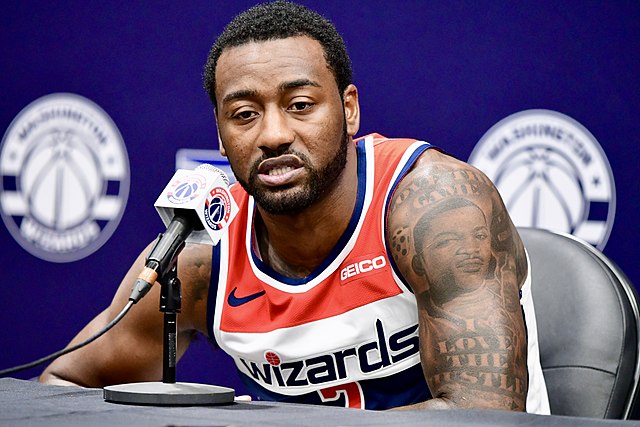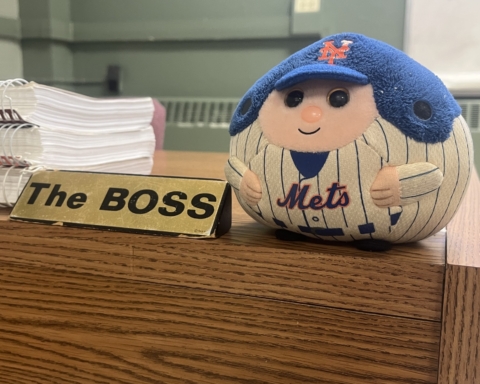BY COLIN BISH, STAFF WRITER
Photo Courtesy of Wikimedia Commons
Before I begin, I want to advise that this article contains mentions of suicide. Some readers may find this content disturbing.
A recent podcast clip of former NBA star John Wall went viral this past month. However, this clip had nothing to do with basketball but something much heavier and frankly unknown in sports: mental health.
In the episode, Wall spoke to former NBA players Udonis Haslem and Mike Miller about his mental health struggles. Wall said he reached his “darkest moment” in September 2020, when a video surfaced of Wall, then with the Houston Rockets, flashing gang signs at a party.
Wall also mentioned two occasions where he held a gun to his head twice and contemplated suicide.
“I wanted to commit suicide, and I was like, ‘Man, if I take myself away from this earth, I’m failing my kids. Who is going to be there to raise them?’” said Wall.
Wall discussed his struggles more in-depth in a 2022 piece for The Players’ Tribune, a sports journalism website that provides written content by professional athletes.
I admire and respect athletes like Wall, who open up about their mental issues. Considering the times we live in, driven by social media and the demand for athletic excellence, it’s challenging for them to be vulnerable about their problems.
For one, the expectation for athletes to push through these mental health issues always infuriates me.
This stigma that athletes are “weak” if they speak up about mental struggles has existed and remained in our society for years. Many people view collegiate and professional athletes as larger-than-life figures expected to perform and succeed no matter what.
We expect athletes to succeed so much in their field that we only view them as “the athlete.” Not the person, son, daughter, husband, wife, friend, etc. Just “the athlete.”
Would someone like to be known as just an office worker and have their value judged only by their professional success? Likely not. So, why does this thought process only apply to athletes?
This sentiment toward athletes likely relates to their massive image. The average athlete is expected to be more known on social media than the average office worker. Athletes often carry a celebrity-like aura that puts them in the limelight, making them more prone to criticism across a broader spectrum.
These athletes are more than just their incredible catches, jaw-dropping dunks, masterful skating and beautiful flips. They are human, and playing a sport doesn’t mean they become invincible to mental stress.
Social media plays a big role in athlete interactions with fans. Unfortunately, these interactions and comments can quickly turn from empathy to apathy.
In 2018, Naomi Osaka defeated her idol Serena Williams 6-2, 6-4 in the US Open final for Osaka’s first Grand Slam title. However, Williams’ heated argument with the referee directed most of the attention.
Following the debacle, many praised Osaka, who was then 20 years old, for her maturity in a tense situation. But it would only take a few years for the narrative to change for the young star.
In June 2021, Osaka withdrew from the French Open after skipping a mandatory press conference, saying she wanted to maintain her mental well-being. Despite an outpouring of support from athletic peers and fans, including Williams, Osaka faced much backlash.
British television personality Piers Morgan tore into Osaka, saying, “Ms Osaka is also an arrogant spoiled brat whose fame and fortune appears to have inflated her ego to gigantic proportions.”
Morgan added, “What’s not meaningless is her frankly contemptible attempt to avoid legitimate media scrutiny by weaponizing mental health to justify her boycott.”
I agree with Morgan on weaponizing mental health. People do use mental health problems to create sympathy instead of facing their issues. I’m guilty of doing so, and I agree that Osaka could have done so to avoid media criticism.
But making such an assumption, to me at least, makes little sense considering what Osaka has experienced. She literally thought people booed her after her match with Williams when she was nowhere in the wrong.
“I know everyone was cheering for (Williams) and I’m sorry it had to end like this,” said Osaka.
Many people in the sports media field even recognize that Osaka looked to be going through mental issues. Helene Elliott, a longtime sportswriter for the Los Angeles Times, said, “I think that this was somebody who was crying for help and kind of reaching out in all kinds of different directions.
Although I’m only assuming, it would make sense if Osaka actually struggles with mental health. From what I’ve read, Osaka has dealt with much strife in her young playing career, from both the media and fans. She has been excessively scrutinized whether she succeeds or fails.
One constant when it comes to being an athlete is failure. Social media has created a safe space where people can harass athletes for their losses and face no repercussions.
Many fans and media personalities criticized and mocked Osaka on social media after withdrawing. More instances of online harassment, both small and large, continue to this day.
In a 2023 college football game between rivals Colorado State and Colorado, Colorado State defensive back Henry Blackburn illegally hit Colorado star athlete Travis Hunter on a deep pass.
Following the game, a 43-35 victory for Colorado, CSU athletic director Joe Parker told ESPN that Blackburn’s phone number, campus address, family home address and mother’s phone number were leaked online, with many erratic fans threatening Blackburn and his family.
Did Blackburn commit an arguably dirty play? I think he did, but discerning intent in these plays is always subjective. Some would say he made a dirty play while others argue that he was setting the tone of the game.
But sending death threats to a college student? That’s not at all subjective. It’s disgusting, yet unfortunately quite common.
Former Iowa basketball player Jordan Bohannon showed messages telling Bohannon to kill himself to a local news station. Former Ohio State basketball player EJ Liddell shared threatening messages after his team, a 2-seed in the 2021 Division-1 Men’s Basketball Tournament, lost to 15-seed Oral Roberts in the first round.
And the list just continues. It should shock me that so many athletes receive these messages, but many people live in our world that can’t control their anger and hatred.
Fortunately, many athletes have taken action to help remove this culture from sports or, at least, tried to spread more positive messages in these situations.
Rewinding to the Blackburn incident, while people threatened Blackburn and continuously harassed him online, Hunter, the recipient of Blackburn’s hit, aimed to calm the negative storm.
Hunter posted a video to his YouTube channel where the two talked on a bench about the play and about their lives. After talking, the two would go bowling and the winner would donate a combined $2,000 to a charity of their choice.
Hunter showed that simple forgiveness can do wonders despite perceived bad blood. Hopefully, more people follow Hunter’s example and control themselves better.
These death threats can be a massive hindrance to both collegiate and professional athletes. Not only could this put doubt in their minds about their play, but it could cause them to fear for the safety of their families.
These athletes already deal with enough mental health issues like self-doubt and worry. Adding fear to the equation because someone can’t control their emotions or even gambling problems shows the character of some unfortunate individuals in our society.
I think to fix this issue of constant negative criticism for athletes, we should create a more positive atmosphere where athletes can feel comfortable with sharing their problems.
However, this doesn’t mean we should stop criticizing athletes altogether. Criticizing an athlete’s poor play or questioning their out-of-competition actions can be beneficial.
First, although this may sound narcissistic, athletes’ poor play and questionable behavior give me story ideas. But me or anyone in the media bringing these shortcomings to light can help show athletes that they need to change.
John Wall mentioned that the video of him at a party surfacing on social media was his “darkest moment.” Albeit one example, this shows that athletes take what the media criticizes them about and uses that criticism to be better.
People can cross lines when critiquing an athletes’ behavior or play. But constructive criticism can benefit everyone, where people comment on the situation, give their opinion, and provide solutions for the problem.
Constructive criticism can help media members keep their flow of ideas and players see what they can do better. Although I’m sure that players, with help from their organizations’ services, try to improve on these issues.
Additionally, shifting from harshly ridiculing athletes on their failures and shortcomings to providing legitimate criticism of these issues and offering solutions can create a more positive atmosphere in sports, especially in the relationship between the media and athletes.
Along with fans and athletes butting heads, the media and athletes have always had a tense relationship. Some athletes claim that certain media members try to invoke controversial responses out of them for personal gain. Some media members claim that certain athletes are difficult to speak to and act disrespectfully.
I don’t think more constructive criticism can completely fix this issue of athletes being uncomfortable to be vulnerable. There will still be some people that disrespect and harass athletes, and there will still be some athletes that just don’t want to speak out. But constructive criticism can help everybody take a step in the right direction.
Outside of athletics, people being vulnerable about their mental struggles comes from an accepting and comforting climate to speak on said issues. The same can be applied to athletes; creating a space where athletes don’t have to fear disgrace or shame for mental issues helps everyone.
Athletes benefit because they can be more open about their issues without fearing being labeled as “weak.” Fans and the media benefit because they can see a new side of athletes, their humanity, that is not typically public because of this negative stigma with athletes’ mental health.
Nobody’s perfect; neither are athletes. But the pedestal we hold athletes to be perfect in every facet is too much. They deserve to speak and be vulnerable about their issues, not worry about achieving constant perfection because it’s the “normalized” expectation.
Legendary football coach Vince Lombardi once said, “Perfection is not attainable, but if we chase perfection we can catch excellence.” Everyone strives for excellence, yet we consistently hold athletes to perfection. If athletes constantly strive to be perfect because of these expectations, they will always be stuck in an endless loop of mental struggle because they can’t obtain perfection.
Therefore, we need to break this stigma. We need to stop expecting perfection from athletes because there’s nothing to expect. We need to accept athletes’ successes and failures because both can help their growth as athletes and as people.
Collegiate and professional athletes have been subject to unfair criticism and a lack of empathy for their mental struggles for far too long. These athletes are people, too. While they may experience stress, anxiety, doubt, and other mental issues differently than us, they still experience these issues nonetheless.
Will changing the view of athletes speaking out take time? Yes. Are there more solutions to this vast issue than just more constructive criticism? Yes again. Will the issue completely go away? No; there will always be more people to tear down athletes for speaking out or just playing poorly.
The issue has multiple layers; it will take time and dedication to create change.
However, with how society has elevated the importance of focusing on mental health, there’s no better time than now to start this change than right now. Our athletes deserve more respect for speaking out than what they are shown today. They deserve to be respected despite their shortcomings, not endlessly ridiculed for the rest of their careers.
bishcj22@bonaventure.edu






